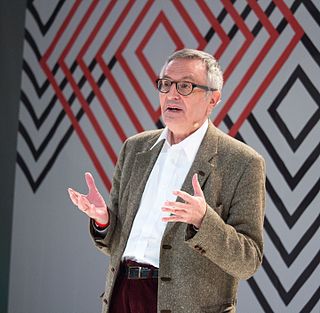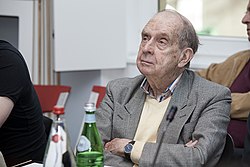Classical liberalism is a political tradition and a branch of liberalism that advocates free market and laissez-faire economics and civil liberties under the rule of law, with special emphasis on individual autonomy, limited government, economic freedom, political freedom and freedom of speech. Classical liberalism, contrary to liberal branches like social liberalism, looks more negatively on social policies, taxation and the state involvement in the lives of individuals, and it advocates deregulation.

Sir Isaiah Berlin was a Russian-British social and political theorist, philosopher, and historian of ideas. Although he became increasingly averse to writing for publication, his improvised lectures and talks were sometimes recorded and transcribed, and many of his spoken words were converted into published essays and books, both by himself and by others, especially his principal editor from 1974, Henry Hardy.

Alexis Charles Henri Clérel, comte de Tocqueville, usually known as just Tocqueville, was a French aristocrat, diplomat, sociologist, political scientist, political philosopher, and historian. He is best known for his works Democracy in America and The Old Regime and the Revolution (1856). In both, he analyzed the living standards and social conditions of individuals as well as their relationship to the market and state in Western societies. Democracy in America was published after Tocqueville's travels in the United States and is today considered an early work of sociology and political science.

François Pierre Guillaume Guizot was a French historian, orator, and statesman. Guizot was a dominant figure in French politics prior to the Revolution of 1848.

Conrad Sebastian Robert Russell, 5th Earl Russell,, was a British historian and politician. His parents were the philosopher and mathematician Bertrand Russell and his third wife Patricia Russell. He was also a great-grandson of the 19th-century British Whig Prime Minister Lord John Russell. He succeeded to the earldom on the death of his half-brother, John Russell, on 16 December 1987. Both sons were named after their father's great friend Joseph Conrad, who was also the 4th Earl's godfather.
Ordoliberalism is the German variant of economic liberalism that emphasizes the need for government to ensure that the free market produces results close to its theoretical potential but does not advocate for a welfare state.
Social liberalism is a political philosophy and variety of liberalism that endorses social justice, social services, a mixed economy, and the expansion of civil and political rights, as opposed to classical liberalism which supports unregulated laissez faire capitalism with very few government services.
Liberal conservatism is a political ideology combining conservative policies with liberal stances, especially on economic issues but also on social and ethical matters, representing a brand of political conservatism strongly influenced by liberalism.
Louis Hartz was an American political scientist, historian, and a professor at Harvard, where he taught from 1942 until 1974. Hartz’s teaching and various writings —books and articles— have had an important influence on American political theory and comparative history.

John Nicholas Gray is an English political philosopher and author with interests in analytic philosophy, the history of ideas, and philosophical pessimism. He retired in 2008 as School Professor of European Thought at the London School of Economics and Political Science. Gray contributes regularly to The Guardian, The Times Literary Supplement and the New Statesman, where he is the lead book reviewer. He is an atheist.
Classical republicanism, also known as civic republicanism or civic humanism, is a form of republicanism developed in the Renaissance inspired by the governmental forms and writings of classical antiquity, especially such classical writers as Aristotle, Polybius, and Cicero. Classical republicanism is built around concepts such as liberty as non-domination, self-government, rule of law, property-based personality, anti-corruption, abolition of monarchy, civics, civil society, common good, civic virtue, popular sovereignty, patriotism and mixed government.
In ethics, value pluralism is the idea that there are several values which may be equally correct and fundamental, and yet in conflict with each other. In addition, value-pluralism postulates that in many cases, such incompatible values may be incommensurable, in the sense that there is no objective ordering of them in terms of importance. Value pluralism is opposed to value monism, which states that all other forms of value can be commensured with or reduced to a single form.
Conservative liberalism, also referred to as right-liberalism, is a variant of liberalism, combining liberal values and policies with conservative stances, or simply representing the right-wing of the liberal movement. In the case of modern conservative liberalism, scholars sometimes see it as a more positive and less radical variant of classical liberalism; it is also referred to as an individual tradition that distinguishes it from classical liberalism and social liberalism. Conservative liberal parties tend to combine economically liberal policies with more traditional stances and personal beliefs on social and ethical issues. Ordoliberalism is a influential component of conservative-liberal thought, particularly in its German, British, French, Italian, and American manifestations.
During the Bourbon Restoration (1814–1830) and the July Monarchy (1830–1848), the Doctrinals were a group of French royalists who hoped to reconcile the monarchy with the French Revolution and power with liberty. Headed by Royer-Collard, these liberal royalists were in favor of a constitutional monarchy, but with a heavily restricted census suffrage—Louis XVIII, who had been restored to the throne, had granted a Charter to the French with a Chamber of Peers and a Chamber of Deputies elected under tight electoral laws. The Doctrinaires were a centrist, as well as a conservative-liberal group, but at that time, liberal was considered to be the mainstream political left, so the group was considered a centre-left group.
Jonathan Irvine Israel is a British historian specialising in Dutch history, the Age of Enlightenment, Spinoza's Philosophy and European Jews. Israel was appointed as Andrew W. Mellon Professor in the School of Historical Studies at the Institute for Advanced Study, Princeton, New Jersey, in January 2001 and retired in July 2016. He was previously Professor of Dutch History and Institutions at the University College London.
Alan James Ryan is a British philosopher. He was Professor of Politics at the University of Oxford. He was also Warden of New College, Oxford, from 1996 to 2009. He retired as Professor Emeritus in September 2015 and lives in Summertown, Oxford.
Sittlichkeit is the concept of "ethical life" or "ethical order" furthered by German philosopher Georg Wilhelm Friedrich Hegel. It was first presented in his work Phenomenology of Spirit (1807) to refer to "ethical behavior grounded in custom and tradition and developed through habit and imitation in accordance with the objective laws of the community" and it was further developed in his work Elements of the Philosophy of Right (1820).
Liberalism is a political and moral philosophy based on the rights of the individual, liberty, consent of the governed, political equality, right to private property and equality before the law. Liberals espouse various views depending on their understanding of these principles but generally support private property, market economies, individual rights, liberal democracy, secularism, rule of law, economic and political freedom, freedom of speech, freedom of the press, freedom of assembly, and freedom of religion, constitutional government and privacy rights. Liberalism is frequently cited as the dominant ideology of modern history.
Liberalism, the belief in freedom, equality, democracy and human rights, is historically associated with thinkers such as John Locke and Montesquieu, and with constitutionally limiting the power of the monarch, affirming parliamentary supremacy, passing the Bill of Rights and establishing the principle of "consent of the governed". The 1776 Declaration of Independence of the United States founded the nascent republic on liberal principles without the encumbrance of hereditary aristocracy—the declaration stated that "all men are created equal and endowed by their creator with certain unalienable rights, among these life, liberty, and the pursuit of happiness". A few years later, the French Revolution overthrew the hereditary aristocracy, with the slogan "liberty, equality, fraternity" and was the first state in history to grant universal male suffrage. The Declaration of the Rights of Man and of the Citizen, first codified in 1789 in France, is a foundational document of both liberalism and human rights, itself based on the U.S. Declaration of Independence written in 1776. The intellectual progress of the Enlightenment, which questioned old traditions about societies and governments, eventually coalesced into powerful revolutionary movements that toppled what the French called the Ancien Régime, the belief in absolute monarchy and established religion, especially in Europe, Latin America and North America.
Graeme Garrard is a Canadian political theorist and writer. He is Professor of Politics at Cardiff University in the UK.





